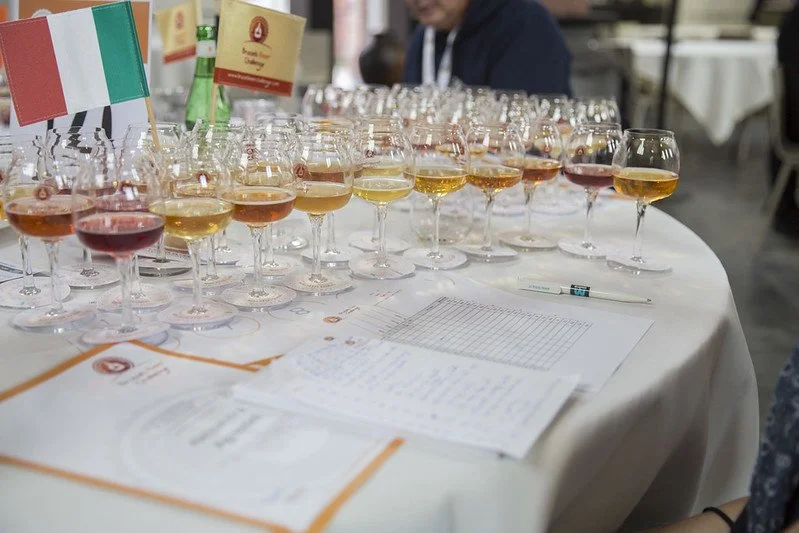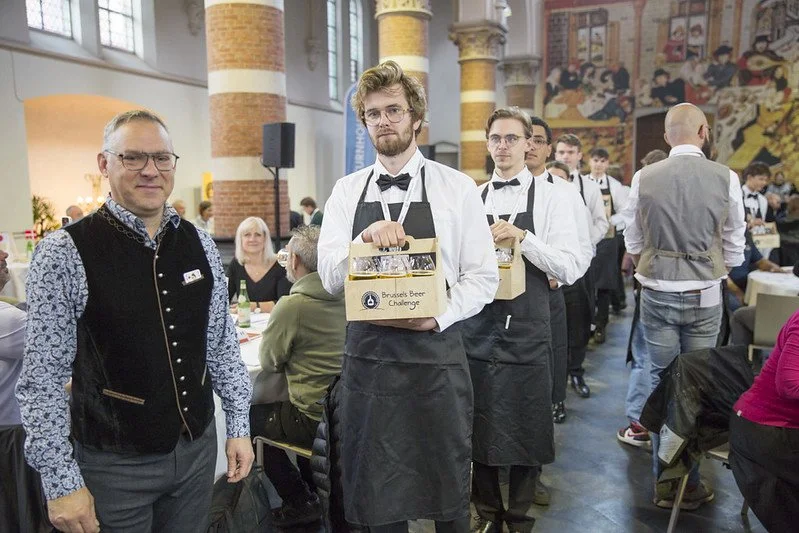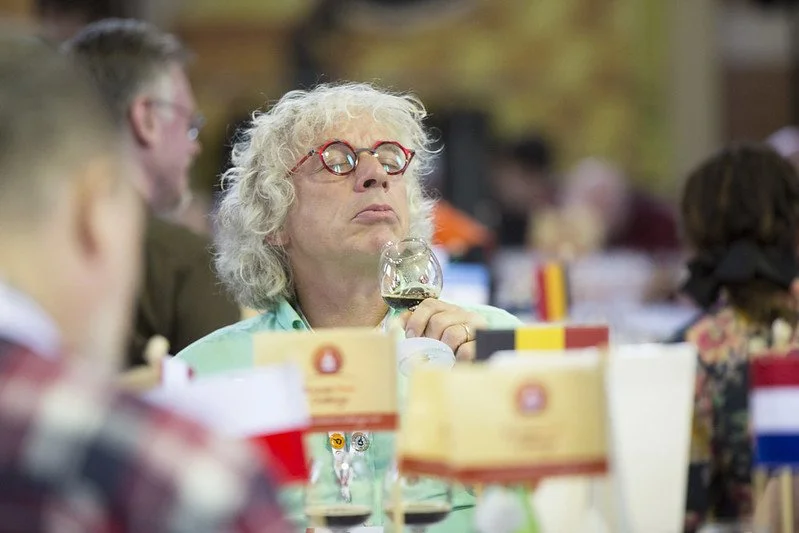What is the Brussels Beer Challenge?
Brussels Beer Challenge Logo
The Global Verdict on Beer Excellence.
For aficionados, brewers, and casual drinkers alike, the world of beer offers an astonishing array of flavors, styles, and traditions. But how do you navigate this vast landscape to find truly exceptional beer? Enter the Brussels Beer Challenge (BBC), one of the world's most respected international beer competitions. More than just a contest, the BBC stands as a beacon for quality, a rigorous proving ground for brewers, and a trusted guide for consumers seeking excellence in every sip. My own experience as a judge in 2023 deepened my appreciation for the competition’s meticulous process and profound impact.
The mission of the Brussels Beer Challenge is simple yet profound: to promote quality beers from around the globe and to stamp them with a coveted seal of approval that helps both emerging and established breweries stand out in a crowded market. This post will take you on a journey through the BBC – from its rich history rooted in Belgian brewing tradition to its meticulous blind-tasting process, the global scale of its operations, and the significant impact its awards have on the international beer scene. We’ll also highlight some exciting aspects of the 2024 results, fresh off the heels of the recent competition.
The Context: Why Belgium? The Cradle of Beer Tradition
It's no accident that one of the world’s most prestigious beer competitions found its home in Belgium. This small European nation boasts a brewing heritage unlike any other, deeply woven into its cultural fabric. From the contemplative Trappist ales brewed within monastery walls to the spontaneously fermented Lambics of the Senne Valley and the refreshing Saisons of Wallonia, Belgium has pioneered, preserved, and perfected a diverse range of beer styles that have influenced brewers worldwide. This profound respect for beer as an art form and a cultural institution elevates the Brussels Beer Challenge, grounding it in centuries of expertise and passion.
The Brussels Beer Challenge itself, while rooted in this rich history, is a relatively modern initiative, launched in 2012. From its early days in iconic Brussels venues like La Bourse, which now houses the Belgian Beer World experience, the BBC has made a point of moving its competition across Belgium. This not only showcases different regions of the country but also brings the competition closer to various local brewing communities. For example, the 2024 edition was held in the historic city of Ghent, while the 2025 challenge is currently in-process in Marche-en-Famenne. This itinerant nature underscores its national significance while maintaining its international outlook.
Scale and Logistics: The Global Beer Census
Imagine a colossal library, but instead of books, every shelf is laden with a different beer, each vying for recognition. That's the sheer scale of the Brussels Beer Challenge. Annually, the competition receives an staggering number of entries—over 1,700 to 1,800 beers—from brewers representing more than 39 countries. This makes it a true global census of the brewing world, reflecting the diversity and innovation happening across continents.
The challenge categorizes entries meticulously to ensure fair and style-specific judging. This isn't a free-for-all; beers are grouped into extensive categories such as Lager, Pale & Amber Ale, Wheat Beer, Stout/Porter, Belgian Styles, and many more, each with numerous sub-categories. This ensures that an Imperial Stout isn't unfairly judged against a light Pilsner, allowing for genuine comparison within a style's parameters.
Stewards Carry Beer to Judges
The logistics involved are immense. Brewers typically submit six samples for smaller bottles or three for larger formats, all requiring careful temperature-controlled shipping from every corner of the globe. Once in Belgium, these thousands of bottles are meticulously cataloged, stored, and prepared for the three-day judging marathon. This careful preparation is essential to present each beer in its optimal condition, ensuring that every entry has an equal chance to impress the judges. This comprehensive, international character is precisely what lends the BBC its unique prestige and makes its medals so valuable in the global beer market.
The Blind Process: Expert Judgment and Impartiality
The heart of the Brussels Beer Challenge lies in its rigorous, impartial, and highly professional blind-tasting process. This is where the magic (and the hard work) happens. Each year, the BBC assembles a formidable panel of approximately 80 world-class experts. These aren't just casual drinkers; they are highly experienced sommeliers, respected beer journalists, award-winning brewers, celebrated authors, and educators, many of whom hold certifications from the well-known establishments such as: Beer Judge Certification Program (BJCP) or Cicerone Certification Program. The international composition of the jury is striking, with judges hailing from diverse beer cultures spanning Brazil, Canada, China, the US, Italy, Japan, France, the Netherlands, and of course, Belgium itself, bringing a truly global perspective to the tasting tables.
Beer Judges Sometimes Close Their Eyes
The crucial element of the BBC's credibility is its absolute commitment to blind tasting. As a judge, you receive a flight of beers with no identifying information whatsoever—no brand names, no brewery details, no country of origin. This anonymity is paramount. It eliminates any potential bias, preconception, or influence of marketing. What you taste is simply the beer, judged purely on its merits.
Beers are judged based on their adherence to style, aroma, flavor, mouthfeel, and overall impression. The judging panels, typically comprising of four to five judges, work in concentrated silence, meticulously evaluating each sample. They use detailed score sheets, marking down their observations and scores for each attribute. A small flag indicating the country of origin is placed on the table, which I always found a fascinating reveal after the judging was complete. The best beers in each category, having successfully navigated this gauntlet of expert palates, are awarded the coveted Gold, Silver, or Bronze medals. The atmosphere, as seen in the accompanying images, is one of intense focus and dedication to the craft.
2024: Trends and Triumphs from Ghent
The most recent edition of the Brussels Beer Challenge, held in the vibrant Belgian city of Ghent, once again showcased the dynamic landscape of global beer. The statistics were impressive: Belgium continued its strong performance, securing over 70 awards and leading the medal count, a testament to its enduring brewing prowess. Close behind were countries like Italy and the Netherlands, demonstrating the strength of their brewing industries.
The 2024 results also offered fascinating insights into current beer trends. The growth of the Non-Alcoholic and Low-Alcohol beer category was particularly notable, reflecting a global shift towards mindful drinking without compromising on flavor. Fruit beers continued their sustained popularity, offering a refreshing and innovative segment. And, predictably, classic Belgian styles like the Tripel once again proved their timeless appeal, collecting numerous accolades.
The highest honor, the Best of Show 2024 award, went to an outstanding Italian beer: Ruggine, an American Pale Ale brewed by Diciottozerouno srl. This win underscores the global reach of brewing excellence and the BBC's role in uncovering exceptional beer from any origin. Beyond this top prize, various "Revelation" awards celebrated the best beer from specific countries or regions. For instance, Tripel Lefort was named the Best Belgian beer, while Uptown Squirrel took home the title of Best American beer. These specific recognitions provide invaluable exposure for brewers and serve as excellent recommendations for consumers.
The Medal Effect: Boosting Business and Consumer Trust
Winning a medal at the Brussels Beer Challenge is far more than just a pat on the back for a brewer; it’s a powerful commercial asset. The impact of a BBC medal on a brewery's business can be transformative. We've seen concrete examples, like an Italian brewery reporting a staggering 200% increase in online orders shortly after securing a BBC award. This "medal effect" is a direct result of the trust and prestige associated with the competition.
BBC Gold Medal on a Shelf
For consumers, the BBC medal acts as an invaluable quality seal. In an increasingly saturated market, where new beers emerge daily, these awards help guide purchasing decisions. When you see a beer proudly displaying a Brussels Beer Challenge medal, you know it has passed the rigorous scrutiny of an international panel of experts, assuring a certain level of quality and authenticity. It’s a shortcut to confidence in a complex world of choices.
Beyond the immediate sales boost, winning also provides unparalleled international exposure. The BBC doesn't just hand out medals and call it a day; it actively promotes its winners. Through dedicated promotional campaigns, extensive press coverage, and award ceremonies held in key markets such as the Brazil, the US, China, and Italy, the competition ensures that winning beers gain maximum visibility. This international push helps small and medium-sized breweries reach new audiences and expand their global footprint, truly showcasing the best of global beer to the world.




